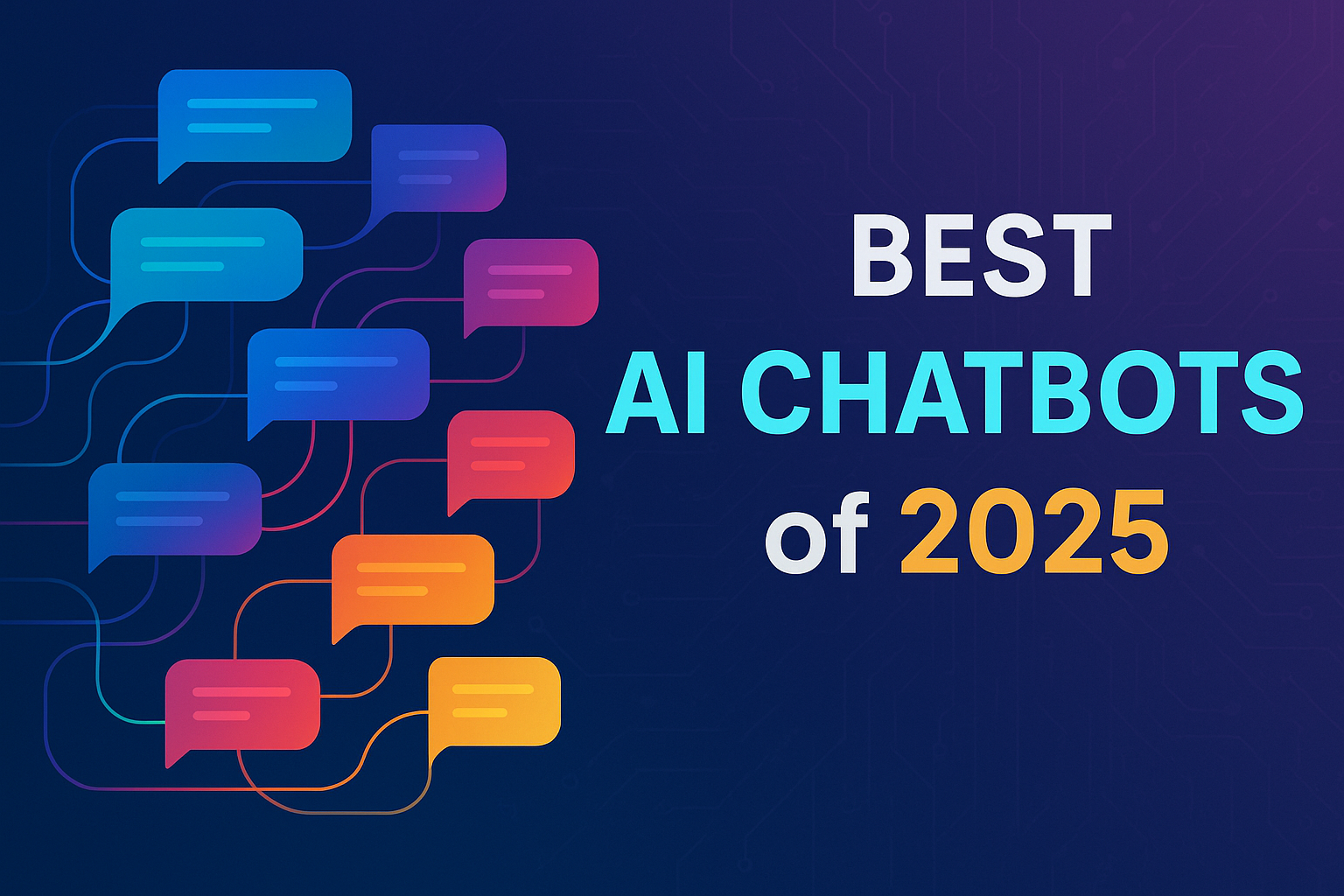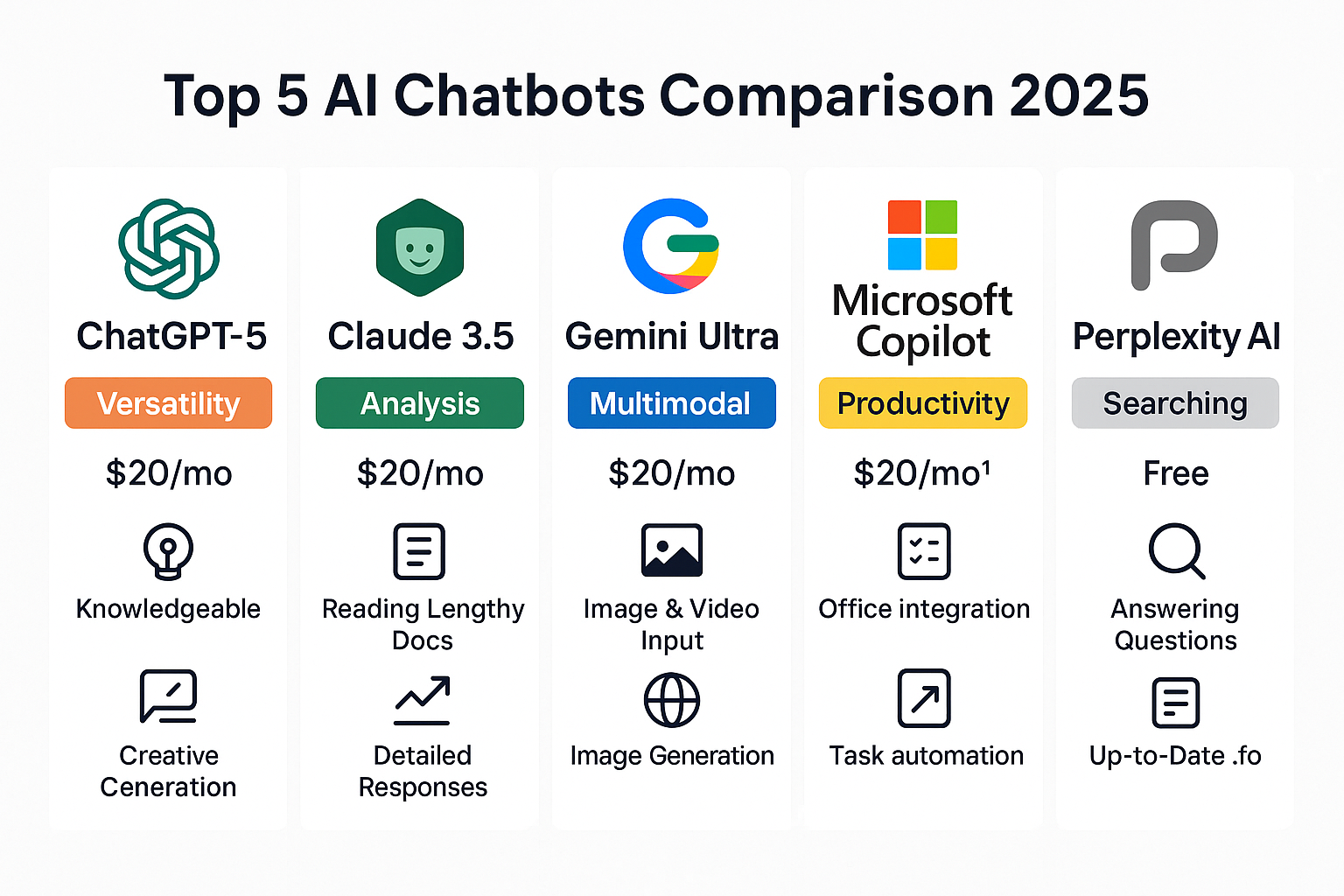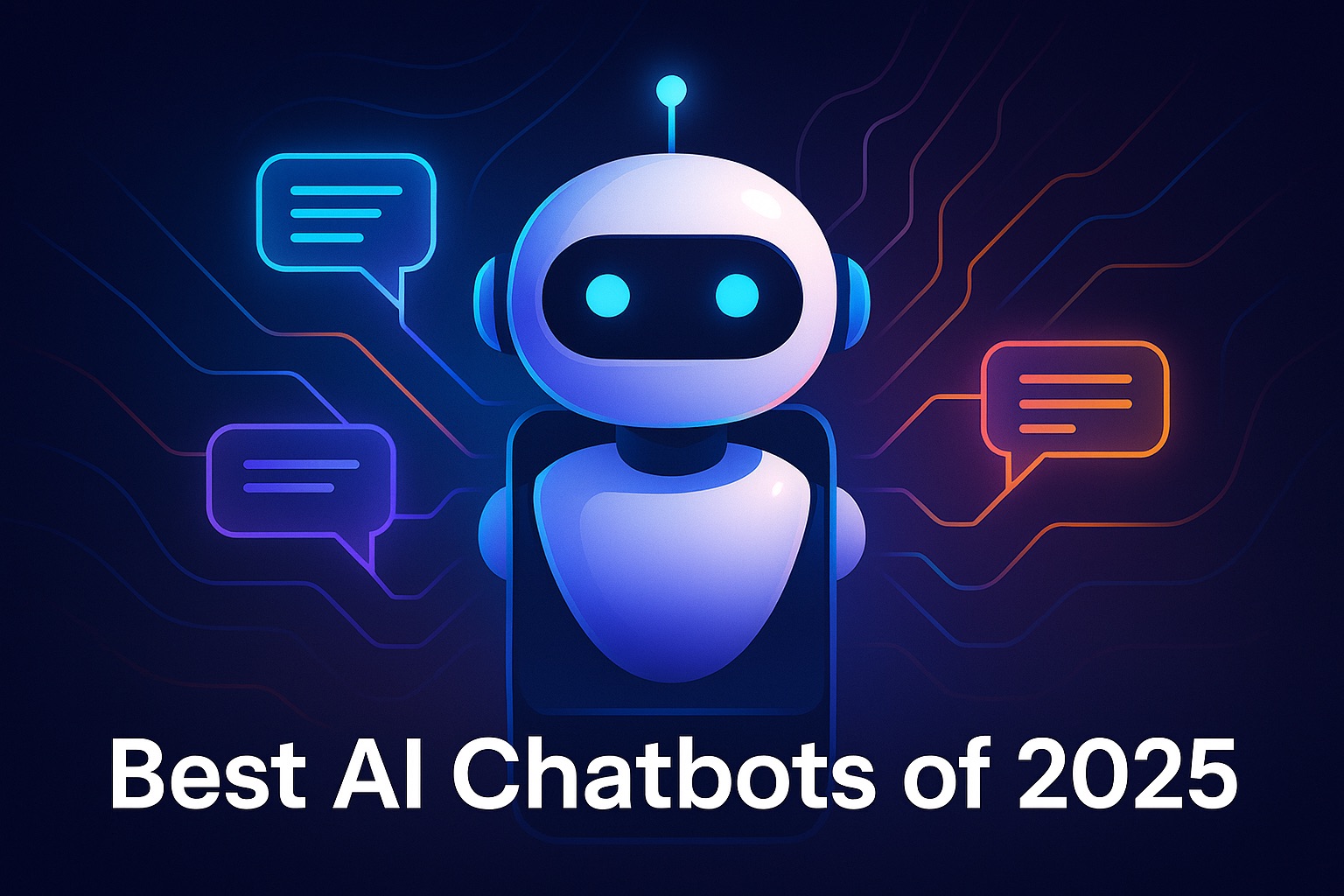Remember when talking to a computer meant typing rigid commands and hoping for the best? Well, those days are ancient history! In 2025, AI chatbots have become so sophisticated that they’re practically indistinguishable from chatting with your smartest friend – except they never sleep, never judge, and always have time for your questions.
I’ve spent the last few months testing every major AI chatbot on the market, and let me tell you, the competition is fierce. Whether you’re looking to boost your productivity, get creative assistance, or simply have an intelligent conversation partner, there’s an AI chatbot out there that’s perfect for you. But with so many options available, how do you choose the right one?
That’s exactly what we’ll explore in this comprehensive guide. I’ll walk you through the best AI chatbots of 2025, breaking down their strengths, weaknesses, and ideal use cases. By the end of this article, you’ll know exactly which chatbot deserves a spot in your digital toolkit.
Key Takeaways

- ChatGPT-5 leads the pack with its multimodal capabilities and advanced reasoning, making it ideal for complex tasks and creative projects
- Claude 3.5 excels at long-form content and technical documentation, perfect for writers and developers
- Google Gemini Ultra dominates real-time information retrieval and integrates seamlessly with Google’s ecosystem
- Specialized chatbots like GitHub Copilot X and Jasper AI offer targeted solutions for specific industries
- Free options like Microsoft Copilot and Perplexity AI provide excellent value for casual users
What Makes a Great AI Chatbot in 2025?
Before we dive into the specific chatbots, let’s talk about what separates the best from the rest. In 2025, a top-tier AI chatbot needs more than just the ability to string words together. Here’s what I look for:
Core Capabilities
- Natural Language Understanding: Can it grasp context, nuance, and even sarcasm?
- Multimodal Processing: Does it handle text, images, audio, and video?
- Real-time Information: Can it access current data and events?
- Memory and Context: Does it remember previous conversations?
- Task Completion: Can it actually help you get things done?
User Experience Factors
- Speed and responsiveness
- Interface design and ease of use
- Integration with other tools
- Customization options
- Mobile accessibility
The Top 10 AI Chatbots of 2025
1. ChatGPT-5: The Versatile Powerhouse
OpenAI’s latest iteration has set a new standard for what AI chatbots can achieve. ChatGPT-5 isn’t just an incremental upgrade – it’s a quantum leap forward.
Key Features:
- Multimodal mastery: Seamlessly processes text, images, audio, and even video inputs
- Enhanced reasoning: Solves complex problems with step-by-step logic
- Custom GPTs: Create specialized versions for specific tasks
- Real-time web access: Always up-to-date with current events
- Code interpreter: Runs Python code and performs data analysis
Pricing:
- Free tier: 50 messages per day
- Plus: $25/month (unlimited messages, priority access)
- Pro: $50/month (advanced features, API access)
Best For: General-purpose use, creative writing, coding assistance, research, and problem-solving
Limitations: Can still occasionally generate incorrect information, premium features are pricey
2. Claude 4: The Thoughtful Assistant
Anthropic’s Claude has earned a reputation as the “intellectual’s chatbot,” and version 4 solidifies that position. What sets Claude apart is its ability to handle incredibly long documents – we’re talking entire books here!
Key Features:
- 200,000 token context window: Analyze lengthy documents with ease
- Constitutional AI: Built-in safety measures and ethical considerations
- Excellent at technical writing: Produces clear, well-structured content
- Code generation: Particularly strong with Python and JavaScript
- Nuanced responses: Acknowledges uncertainty and provides balanced perspectives
Pricing:
- Free tier: 30 messages per day
- Pro: $20/month (priority access, higher limits)
- Team: $30/user/month (collaboration features)
Best For: Academic research, technical documentation, long-form content creation, ethical discussions
Limitations: No real-time web access, limited multimodal capabilities compared to competitors
3. Google Gemini Ultra: The Information Powerhouse
Google’s flagship AI chatbot leverages the company’s vast search infrastructure to deliver unparalleled real-time information access. If you need current data, Gemini Ultra is your go-to assistant.
Key Features:
- Deep Google integration: Access to Search, Maps, YouTube, and more
- Real-time information: Always current with the latest news and data
- Multimodal excellence: Superior image and video understanding
- Workspace integration: Works seamlessly with Docs, Sheets, and Gmail
- Multiple response drafts: Provides alternative answers to choose from
Pricing:
- Free tier: Basic features with daily limits
- Gemini Advanced: $19.99/month (full features, 2TB storage)
- Workspace integration: Included with Google One AI Premium
Best For: Research, fact-checking, Google ecosystem users, real-time information needs
Limitations: Sometimes overly cautious with responses, privacy concerns for some users
4. Microsoft Copilot: The Productivity Champion
Built on GPT-4 technology but enhanced with Microsoft’s enterprise focus, Copilot has become the Swiss Army knife of workplace AI.
Key Features:
- Office 365 integration: Works within Word, Excel, PowerPoint, and Outlook
- Enterprise-grade security: Meets corporate compliance standards
- Image generation: Creates visuals using DALL-E 3
- Voice interaction: Natural conversation capabilities
- Custom plugins: Extend functionality with third-party integrations
Pricing:
- Free tier: Web-based access with limits
- Microsoft 365 Copilot: $30/user/month (full Office integration)
- Enterprise: Custom pricing with advanced features
Best For: Business users, Office 365 power users, enterprise environments
Limitations: Best features require Microsoft 365 subscription, less creative than standalone options
5. Perplexity AI: The Research Specialist
Think of Perplexity as your personal research assistant who always cites sources. It’s become indispensable for anyone who values accuracy and verification.
Key Features:
- Source citations: Every answer includes verifiable references
- Follow-up questions: Suggests related queries to deepen understanding
- Academic focus: Excels at scholarly and technical research
- Clean interface: Distraction-free design for focused work
- Collection feature: Save and organize research threads
Pricing:
- Free tier: Unlimited basic searches
- Pro: $20/month (GPT-4 access, unlimited Pro searches)
Best For: Students, researchers, journalists, fact-checkers
Limitations: Less versatile for creative tasks, focused primarily on information retrieval
6. GitHub Copilot X: The Developer’s Dream
GitHub’s AI pair programmer has evolved into a comprehensive development assistant that goes far beyond code completion.
Key Features:
- Context-aware code suggestions: Understands your entire codebase
- Chat interface: Ask questions about your code
- Documentation generation: Creates README files and comments
- Bug detection: Identifies potential issues before they cause problems
- Multi-language support: Works with virtually every programming language
Pricing:
- Individual: $10/month
- Business: $19/user/month
- Enterprise: $39/user/month
Best For: Software developers, DevOps teams, coding students
Limitations: Primarily focused on coding tasks, requires GitHub account
7. Jasper AI: The Content Creator’s Companion
Jasper has carved out a niche as the go-to AI for marketing and content creation, with templates and tools specifically designed for digital marketers.
Key Features:
- 50+ content templates: Blog posts, ads, emails, and more
- Brand voice training: Maintains consistent tone across content
- SEO optimization: Built-in tools for search engine visibility
- Team collaboration: Share and edit content with colleagues
- Plagiarism checker: Ensures originality
Pricing:
- Creator: $49/month (1 user, 50,000 words)
- Teams: $125/month (3 users, unlimited words)
- Business: Custom pricing
Best For: Content marketers, bloggers, social media managers, copywriters
Limitations: Expensive compared to general-purpose chatbots, focused on marketing use cases
8. Character.AI: The Personality Playground
Want to chat with Einstein, debate with Socrates, or get advice from your favorite fictional character? Character.AI makes it possible with its unique approach to conversational AI.
Key Features:
- Custom character creation: Design your own AI personalities
- Multiple character chats: Have group conversations with different AIs
- Role-playing capabilities: Immersive storytelling experiences
- Community library: Access thousands of user-created characters
- Voice interaction: Some characters support voice chat
Pricing:
- Free tier: Unlimited chats with queue priority
- Character.AI+: $9.99/month (priority access, faster responses)
Best For: Entertainment, creative writing, language learning, role-playing
Limitations: Not suitable for factual research, can be inconsistent with information
9. Pi: The Empathetic Companion
Inflection AI’s Pi takes a different approach, focusing on emotional intelligence and supportive conversation rather than task completion.
Key Features:
- Conversational memory: Remembers details across all interactions
- Emotional support: Designed for meaningful, supportive dialogue
- Voice options: Multiple natural-sounding voices
- Daily check-ins: Proactive engagement to maintain connection
- Privacy-focused: Minimal data collection
Pricing:
- Completely free (supported by Inflection AI funding)
Best For: Personal reflection, emotional support, casual conversation, daily journaling
Limitations: Not designed for complex tasks or factual research
Comparison Table: Quick Reference Guide

| Chatbot | Best For | Starting Price | Key Strength | Major Limitation |
|---|---|---|---|---|
| ChatGPT-5 | All-purpose use | Free/$25 | Versatility | Can hallucinate |
| Claude 4 | Long documents | Free/$20 | Context length | No web access |
| Gemini Ultra | Research | Free/$19.99 | Real-time info | Privacy concerns |
| Copilot | Productivity | Free/$30 | Office integration | Subscription needed |
| Perplexity | Fact-checking | Free/$20 | Source citations | Limited creativity |
| GitHub Copilot X | Coding | $10 | Code understanding | Developers only |
| Jasper AI | Marketing | $49 | Content templates | Expensive |
| Character.AI | Entertainment | Free/$9.99 | Personality variety | Not factual |
| Pi | Companionship | Free | Emotional support | Limited functionality |
How to Choose the Right AI Chatbot for Your Needs
With so many excellent options available, selecting the right chatbot can feel overwhelming. Here’s my framework for making the decision:
1. Define Your Primary Use Case
Ask yourself:
- What will I use this chatbot for most often?
- Do I need specialized features or general assistance?
- How important is accuracy versus creativity?
2. Consider Your Budget
- Free tiers are perfect for casual users and testing
- Paid plans unlock advanced features and higher limits
- Enterprise options provide team collaboration and security
3. Evaluate Integration Needs
Think about:
- What other tools do you use daily?
- Do you need API access?
- Is mobile access important?
4. Test Before Committing
Most chatbots offer free trials or tiers. I recommend:
- Testing your top 3 choices for a week each
- Using them for your actual work tasks
- Comparing the quality of outputs
Tips for Getting the Most Out of AI Chatbots
After extensive testing, here are my top strategies for maximizing your AI chatbot experience:
Master the Art of Prompting
The quality of your outputs depends heavily on your inputs. Here’s how to craft better prompts:
- Be specific: Instead of “Write about dogs,” try “Write a 500-word beginner’s guide to training a puppy, focusing on positive reinforcement techniques”
- Provide context: Give the chatbot relevant background information
- Use examples: Show the chatbot what you’re looking for
- Iterate: Don’t settle for the first response – refine and improve
Leverage Advanced Features
- Custom instructions: Set preferences that apply to all conversations
- Voice input: Often faster than typing for complex queries
- Image uploads: Use visual aids to enhance understanding
- Export options: Save important conversations for future reference
Combine Multiple Chatbots
Don’t limit yourself to just one! I often use:
- Perplexity for initial research
- Claude for in-depth analysis
- ChatGPT for creative refinement
- Gemini for fact-checking
The Future of AI Chatbots: What’s Next?
As we look beyond 2025, several exciting trends are emerging:
Increased Personalization
Future chatbots will learn your preferences, writing style, and needs over time, becoming truly personalized assistants.
Better Multimodal Integration
Expect seamless handling of mixed media inputs – sketch an idea, describe it verbally, and watch the AI bring it to life.
Specialized Industry Solutions
We’ll see more chatbots designed for specific professions: legal assistants, medical advisors, financial analysts, and more.
Enhanced Collaboration Features
AI chatbots will become better team players, facilitating group brainstorming and project management.
Improved Accuracy and Reliability
The hallucination problem will continue to diminish as models become more grounded in factual data.
Common Pitfalls to Avoid
Even the best AI chatbots have limitations. Here are mistakes I see users make:
Blindly trusting outputs: Always verify important information
Ignoring privacy concerns: Be cautious about sharing sensitive data
Over-relying on AI: Use chatbots to enhance, not replace, human judgment
Neglecting prompt refinement: Good inputs create good outputs
Expecting perfection: AI is a tool, not a magic solution
Conclusion: Your AI Journey Starts Now
The AI chatbot landscape of 2025 offers something for everyone. Whether you’re a developer looking to accelerate your coding, a writer seeking creative inspiration, or a business professional aiming to boost productivity, there’s a perfect AI assistant waiting for you.
My recommendation? Start with the free tiers of 2-3 chatbots that align with your primary needs. Spend time learning their strengths and quirks. Most importantly, approach them as collaborative tools rather than replacement solutions.
The chatbots I’ve covered represent the current best-in-class options, but this space evolves rapidly. New features launch monthly, and entirely new players enter the market regularly. Stay curious, keep experimenting, and don’t be afraid to switch tools as your needs change.
Ready to dive in? Here’s your action plan:
- Choose your starter chatbot: Based on your primary use case, pick one from our top 3 (ChatGPT-5, Claude 4, or Gemini Ultra)
- Set up your account: Take advantage of free tiers to test the waters
- Complete the onboarding: Many chatbots offer tutorials – don’t skip them!
- Start with simple tasks: Build confidence before tackling complex projects
- Join communities: Connect with other users to share tips and tricks
Remember, the best AI chatbot is the one you actually use. So pick one, start chatting, and welcome to the future of human-AI collaboration!




Post a comment